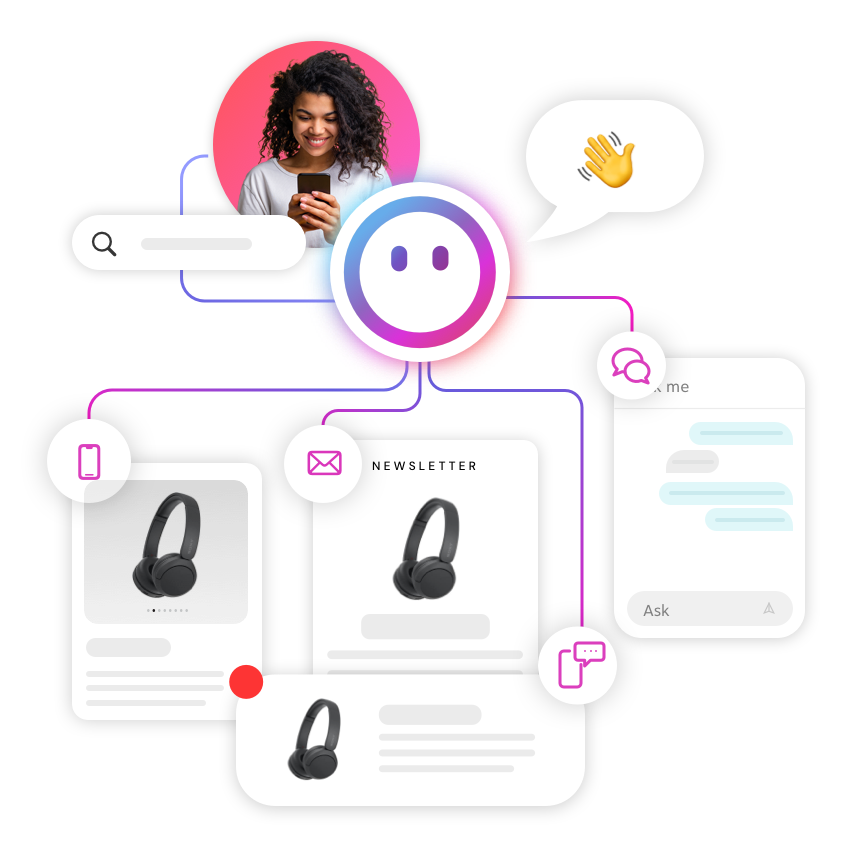Is the beginning of widespread Artificial Intelligence (AI) finally here? Seemingly every day brings some big announcement, from breakthrough findings in ALS research generated by AI data mining to AI-powered phone calls that sound convincingly human (Google’s Duplex).
But for businesses, the concerns are more practical: How to make sense of the new AI technologies and effectively implement it to impact the bottom line. This is a particularly important questions for retailers struggling to adapt in an extremely disruptive environment.
To provide some guidance, we’ve put together a summary of seven AI technologies with the potential to transform the world of retail.
1. Personalization
The holy grail of online retail is personalization: that is, how to provide a shopping experience tailored to the specific preferences, interests, and browsing styles of each individual buyer. The workaround for years here has been segmentation. By separating buyers into various “buckets” based on demographics, region, or purchase history, retailers could create experiences designed to cater to different personas.
While this approach was a good start, AI provides the opportunity to take things much further. Rather than relying on segments, AI technologies are giving retailers the ability to create online experiences for an audience of one – known as “extreme personalization.” Cutting-edge marketing automation software can capture reams of customer data (from clickstreams to browsing history), combine that with real-time information (location data, current weather, etc.) then use AI-powered tools to produce custom offers and shopping environments that match a prospect’s preferences and help them convert.
Imagine marketing emails customers actually look forward to receiving. Or online ads that appear at exactly the right time and in the right context. A bit like Minority Report, maybe, but hopefully without the creepiness.
2. Chatbots
According to Gartner, by 2020 customers will manage 85% of their relationship with a company without interacting with a human. A big component of this will be AI-powered assistants that can provide expert shopping assistance and support to customers at scale and using natural language.
eBay’s Shopbot is a good example. Embedded within Facebook Messenger, the service functions like a chat-based personal assistant, allowing users to ask the AI to locate specific items on eBay, suggest products based on personal preferences, or find similar items based on uploaded images. The idea is to use natural language queries to help customers find items quickly. And the more a customer uses the bot, the better its recommendations get via machine learning.
Currently in beta, Shopbot is just the beginning of what will surely be ever more sophisticated AI assistants in retail.
3. Voice interaction
Related to chatbots is voice-powered retail. More than 29 million voice devices have now been sold in the U.S. with 25% of American customers already having made a purchase using voice. Amazon’s Alexa-controlled Echo leads the pack with competitors like Google Home and others not far behind.
So far, the most popular use in retail is replenishment (that is, refilling previous orders). Using AI-technology, devices scan purchase history and use predictive analytics to suggest new orders – driving new sales and increasing brand loyalty. Food retailers including Starbucks and Dominos have been early adopters, using AI services to help regular customers reorder quickly while suggesting additional items to increase order size.
There’s also an opportunity emerging for fashion retailers. Because fashion purchases are often expensive and complex – requiring lots of back and forth about fabric, fit, etc. – voice-powered services could help guide customers through an involved consideration and purchase process by providing detailed answers to in-depth questions using natural language. Could customers one day be able to have a voice conversation with an AI fashion expert – like a virtual Coco Chanel?
4. Automation
A big buzzword in retail these days is “frictionless,” which means the ability of customers to complete a purchase as quickly and easily as possible. In many cases, the best way to do that is to eliminate the checkout process altogether, as Amazon has done with its experimental brick-and-mortar store Amazon Go. AI-powered sensors called “intelligent vision” detect when products are taken off the shelf and sync that data to your cart via the Amazon mobile app. Additional sensors log when you leave the store and automatically charge your Amazon account.
A similar sensing technology is being employed by companies including Walmart to keep shelves stocked using AI-powered shelf-scanning robots. Items that are missing, misplaced, or mislabeled can be quickly identified and the data relayed to store employees who then handle the restocking manually – although it’s not hard to imagine the entire process eventually becoming automated. In fact, a PwC forecasts that 38% of jobs in the U.S. could be vulnerable to AI by the 2030s.
5. Fraud detection
The combination of faster computing, more sophisticated algorithms, and vast amounts of available data mean considerably better fraud detection is available for retailers via advanced AI. Rather than relying on fixed rules to identify potentially fraudulent transactions, companies are now using machine learning to constantly refine how data is interpreted – a process known as “self-calibrating” – resulting in many fewer false positives. Machine learning as well as deep learning (i.e. using multiple levels of neural networks) help eCommerce companies stay one step ahead of increasingly sophisticated digital fraudsters.
6. Dynamic pricing
In the future, fixed prices may become a thing of the past. The ability to determine the maximum a customer will pay for a product has long been a dream of retailers – and may soon become a reality.
Commonplace in the travel industry (e.g. airfares, hotel rooms, etc.), dynamic pricing strategies are now being applied to retail environments, thanks to AI-powered software that can instantly assimilate multiple consumer data points (i.e. buying behavior, demographics, loyalty cards, location data) and predict a “smart” price point for each customer.
The trick will be implementing this so that customers experience the benefits, rather than feel like they're being gouged. A good strategy might be to focus on bargains – evaluating how responsive certain shoppers are to special offers.
7. Supply chain
AI technology is making perhaps its biggest impact on the retail supply chain, affording efficiencies at nearly every stage. Procurement tasks are now being streamlined with chatbots, allowing personnel to focus on more important tasks. Machine learning is being applied to supply chain planning and warehouse management, enabling better timing of deliveries and better use of physical inventory. Predictive analytics are allowing companies to improve their supplier selection and sourcing methods, improving vendor relations and leading to a more efficient operation overall.
And on the horizon are autonomous vehicles used for logistics and shipping, ushering in an age of pinpoint delivery. The era of drone delivery is here.








